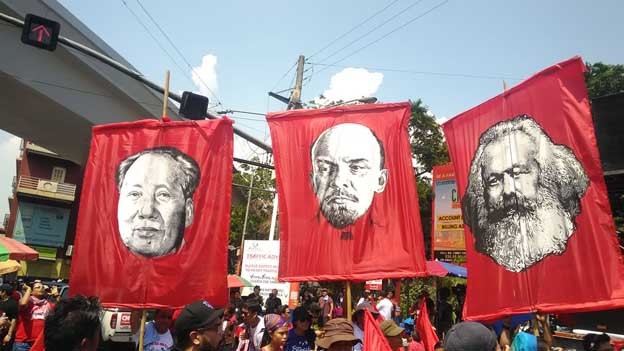Philippine literary production under fascism
Introduction to the Philippines dossier

The bureaucrat capitalist Rodrigo Duterte is establishing his dictatorship in the Philippines. In an alarming throwback to the Marcos dictatorship, he has put the south under martial law, and the number of human rights violations is mounting; the rest of the country is aggressively being militarized. Arriving in the wake of former President Benigno Aquino III’s antipeasant and antiworker regime, the Duterte regime wasted no time establishing itself as the opposition to Aquino’s haciendero elitism. It is, however, a false opposition: in spite of its foul-mouthed attacks on Aquino and his allies, it has not only maintained, but has hastened and intensified, much of the neoliberal accommodation of imperialism made by the object of its attacks. Worse, Duterte has openly welcomed Chinese imperialism into our shores, complementing the longstanding terror of US hegemony: now, Chinese capitalists make the most out of oppressive policies first imposed by US-led financial institutions such as the International Monetary Fund-World Bank, even as the US keeps its military presence in the region and grants direct military aid in support not only of Duterte’s notorious drug war — which has claimed over twenty thousand lives — but of his disastrous counterinsurgency operations. These operations have been targeting the Communist Party of the Philippines, eradicating even civilian labor unionists, peasant leaders, indigenous peoples, and activists of the legal mass movement for national democracy along the way. Even artists with no activist affiliations but have expressed dissent are held by the state in chilling suspicion.
There is much to be done in the Philippines to fight tyranny, and literature easily appears to be one of the ways by which one can participate in the antifascist resistance. The means of producing literature, however, like all means of production under semicolonial and semifeudal conditions, are owned and controlled by the ruling class — the domestic ruling class being big landlords and the comprador bourgeoisie — whose interests are advanced by Duterte’s fascism. Literary production is so deeply entrenched in these conditions that the ruling class profits from even the most progressive texts just from their ownership of literary infrastructure. National Bookstore, for example, the country’s biggest bookstore chain whose consignment fees are hostile to small presses, has shares in the privatized MRT, Metro Manila’s busiest and most quickly deteriorating mode of public transport; Ateneo de Manila University Press, another example, may be one of the country’s leading academic presses, but it is housed within an exorbitantly priced private university whose president is the CEO of Jollibee Foods Corporation, one of the country’s most notorious labor abusers and union-busters.
Much of what can be called radical literature in the Philippines, therefore, springs from efforts by practitioners whose experiments with form include the search for and construction of alternative ways to produce and distribute their work — and much of the content of this radical literature approaches, refracts, or presents the formal accommodation of this struggle to seize the means of literary production. I am proud to introduce these essays by Shaunnah Ysabel Cledera, a founding member of the self-publishing collective Magpies; Ivan Emil Labayne, a member of the art collective Pedantic Pedestrians; Tilde Acuña, an educator and activist affiliated with CONTEND (Congress of Teachers and Educations for Nationalism and Democracy); and myself. We hope, through these formal investigations that require confronting the imperialism, feudalism, and bureaucrat capitalism that shape and hijack Philippine literary production, to contribute to the antifascist struggle taking place worldwide and to help sketch one way toward a people’s — if not a proletarian — literature.
Edited by Divya Victor